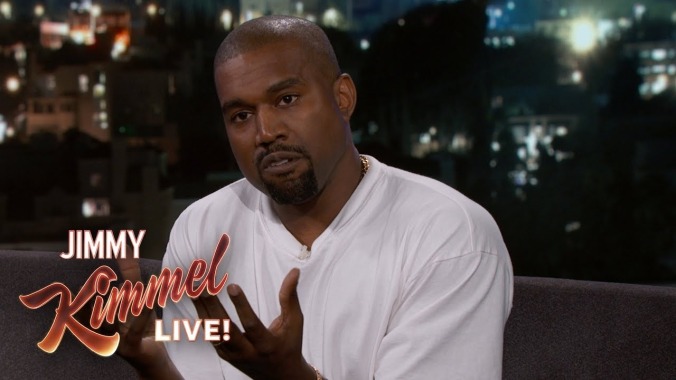Kanye West talks to Jimmy Kimmel about being bi-polar, supporting Donald Trump

After wife Kim Kardashian appeared on Jimmy Kimmel Live! last week, Kanye West followed suit with a wide-ranging, 20-minute interview with Kimmel on Thursday. Actually, “wide-ranging” is selling the scope of their talk short, as Kimmel followed West’s conversation through the multi-hyphenate star’s discussion of his ongoing struggles with mental illness, his clothing line, fatherhood, pornography, Galileo, life as a simulation, and, yes, those to-many baffling statements about slavery and his continued support of Donald Trump. “Can you imagine talking to my publicist before saying I’m going on TV again?,” West joked, in answer back to Kimmel’s question about the practical usefulness of fear. Say what you want, but Kanye West—for better or worse—doesn’t appear to be afraid of much.
Certainly not longtime friend Kimmel’s questions, although the host did manage to render West speechless at one point. Interrupting West’s discursive explanation of his widely discussed statement of support for Trump (in which West spoke of the need to “[defuse] the nuclear bomb of hate by thinking of everyone as our family”), Kimmel prodded his guest, saying, “I think that’s a beautiful thought,
but, just in literal terms, there are families being torn apart at the border.” After a long, silent pause from West, Kimmel threw out a life line, suggesting, “Why don’t we take a break?” When the break was over, so was most of the Trump talk.
Not that one wealthy celebrity expressing solidarity with another is all there is to talk about when Kanye West is in the studio. For the duration of their three-segment chat, Kimmel sat back and listened as West expounded in signature Kanye West style. Referring to his battle with mental illness and his widely publicized hospitalization, West confessed, “I wasn’t full Ye,” while making his latest album (and producing many more). Continuing, “I don’t know if I’m full Ye now,” West spoke feelingly about the need for people, especially people in the black community, to de-stigmatize discussion of mental illness. “People need to be able to express themselves without fear of judgement,” expressed West, adding, “I don’t know anyone that’s fucked up as much as I have.”
While admirable all around, that Ye-esque boldness yet carried in it a disconnect between the multi-millionaire superstar’s abstract rumination on, say, why we become “so focused on history that
we start to believe that it actually repeats itself, and we become overly traditional
and we can’t advance as a race of beings,” and the very practical outrage of people who think that saying slavery was a choice for black people is deeply offensive. The same applies to West’s roundabout sort-of explanation of his support for a president whose statements and actual policies are widely seen as racist and damaging to every black American who isn’t one of Donald Trump’s rich pals. Framing his backing of Trump as an act of defiance against “liberals” and the those who think of the black community as “monolithic,” West’s circuitous restatement of support similarly rang with insular disconnect from the specifics that people without their own clothing line and a standing invite to Mar-a-Lago have about Donald Trump. Preaching against the “deadly sin” of pride, West, in viewing his praise of a politician actively pursuing a racist agenda only in terms of how it reflects on his own courageousness in doing so, looks to have missed his own message. “I’m not concerned about the specifics, sir,” West rebuffed Kimmel at one point earlier in the interview, a statement that only became clearer as his appearance went on.